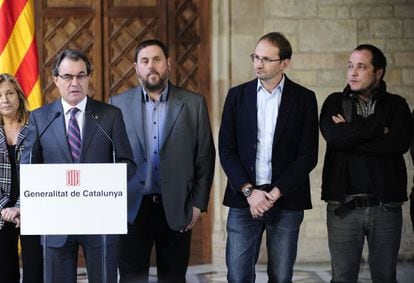Catalan party leaders agree self-rule referendum questions
“I will guarantee you that the status vote is not going to be held," says prime minister Voters to be asked: “Do you want Catalonia to be an independent state?”


The head of the center-right nationalist CiU Catalan government, Artur Mas, and the leaders of the Catalan Republican Left (ERC), the Initiative for Catalonia Greens (ICV) and the left-wing CUP party reached an agreement on Thursday regarding the questions that would be posed were a referendum on self-rule for the northeastern region to be held.
After talks on Thursday morning, Mas, Oriol Junqueras of the ERC, Joan Herrera of the ICV and David Fernández of the CUP agreed on two questions. “Do you want Catalonia to be a state?” is the first, and should the respondent answer yes, they will then be asked: “Do you want Catalonia to be an independent state?” They also announced that they want the referendum be held on November 9, 2014.
An adamant Prime Minister Mariano Rajoy vowed later on Thursday to prevent Catalonia from holding its referendum.
“I will guarantee you that the status vote is not going to be held,” the prime minister said during a joint news conference with European Council President Herman Van Rompuy in Madrid. Rajoy declined to say how he intends to prevent the referendum from being held, saying “it was not my place as prime minister to discuss what the government intends to do.”
“The government that I preside cannot authorize or negotiate something that belongs to all Spaniards,” he said.
At a joint news conference with the other party leaders Mas lamented the fact that the Catalan branch of the Socialist Party (PSC) was not an adherent to the agreement. “We would have liked the PSC, but we are a very ample majority and we have to follow the path that we have marked out for ourselves,” Mas said.
The four parties that reached the agreement have a total of 88 seats in the 135-member Catalan regional assembly.
The conservative Popular Party (PP) government of Prime Minister Mariano Rajoy insists that the Constitution bars Catalonia from holding a consultation of this kind on its own initiative and without Madrid’s consent. Justice Minister Alberto Ruiz-Gallardón wasted no time in reminding the Catalans of that, telling the press in the corridors of Congress that “the state guarantees that the referendum will not be held.”
The spokesman of the PP’s Catalan branch, Enric Millo described the announcement of the questions to be posed as “nonsense.” “Everyone knows that this referendum will not be held, but they insist on spinning this fantasy,” he told the regional assembly. It’s a false hope. This cynicism will end in frustration and can only lead to social confrontation.”
Mas thanked the parties in the agreement for their “generosity and sense of state. “This is historically very far-reaching,” he said. “The date is very specific: November 9, 2014. We are thus holding to our commitment for the consultation to be held in 2014. The November 9 date allows us to ask the question with success. There will be time to guarantee the legal framework and democratic procedures.”
Mas appealed directly to the Rajoy government to negotiate the holding of the referendum on the basis of the agreement between the four Catalan parties. “We’re waiting now for the Spanish state to respond to this solid majority and a public that wants to vote,” he said.
The executive committees of the four parties concerned are expected to ratify the chosen questions at meetings to be held between Thursday and Friday.
ERC had been at odds with the other three parties in insisting that voters should be asked directly if they wanted Catalonia to be independent.
“The question needed to be sufficiently inclusive so as mobilize the biggest majority of Catalan society,” Junqueras said, adding that although the question was not what the ERC wanted, the agreement “includes the majority of the Catalan assembly, which is what is most important.”










































